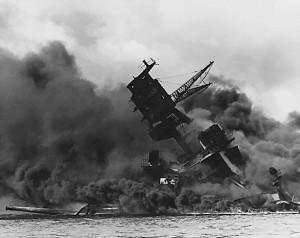I was looking through some history for October this morning, and one event brought back a huge memory from my long-ago childhood.
Anyone remember singing this song in elementary school?
One dark night, while we were all in bed
Old Miz O’Leary left a lantern in the shed
And when the cow kicked it over, she winked her eye and said,
“There’ll be a hot time in the old town tonight.” [Fire! Fire! Fire!]
Anyone? Anyone? Bueller?
Of course, it got me to thinking: why would we sing a hand-clappin’, knee-slappin’, happy song about something that killed between 100 and 300 people, destroyed dozens of city blocks, and left countless children orphans? I guess it’s our way of glossing over the pain. The above song about the Great Chicago Fire of 1871 wouldn’t have a place in any school music curriculum today, I’ll wager. Although … songs about Christopher Columbus sailing the ocean blue in fourteen hundred ninety-two are still all over the place — go figure. I digress.
 What do you do when everything is on fire? You run. You leave everything and run. Then, as we saw so often during the coverage of 9/11, you choke. You can’t get away from the smoke; it gets harder to breathe with every gasp.
What do you do when everything is on fire? You run. You leave everything and run. Then, as we saw so often during the coverage of 9/11, you choke. You can’t get away from the smoke; it gets harder to breathe with every gasp.
There were also tramplings, especially with so many folks trying to get out of town in horse-drawn wagons. I can’t imagine the pandemonium. All this while everything you own burns.
According to the readings, Chicago was supposed to have been a fire-conscious city in an age when fire was at the top of everyone’s fear list. I guess nobody told that to the all the wooden structures that served as fantastic kindling in an area ravaged by drought. The whole “Mrs. O’Leary’s cow” story never really stood up, either; rather, officials speculated that it was careless smoking that did the deed.
Growing up in Wisconsin, there was a general feeling that the Chicago fire overshadowed another tragic conflagration that occurred on the very same day: the Peshtigo Fire. which swallowed up 12 million acres of pristine forest, and killed 1200 people up near Green Bay. Why did the Chicago fire get all the glory? Obvious reasons: big famous city, cool cow story. Made no sense to me.
I do love reading about history, though. Don’t you wish everybody did? By the way. Big ol’ Hershey bar goes to the person who sees the product ad in this paragraph. Name the product and the slogan. First one to post it in a comment here is the big winna. ![]()
All right, I’m late. Speaking of late…the Finkmobile goes in for repair on the 28th. Of November.
Oi.

 Today, 23 April, 376 years ago, school was officially in. In 1635, Boston Latin School became America’s first educational institution funded completely by local government.
Today, 23 April, 376 years ago, school was officially in. In 1635, Boston Latin School became America’s first educational institution funded completely by local government. That’s how I remember it.
That’s how I remember it.